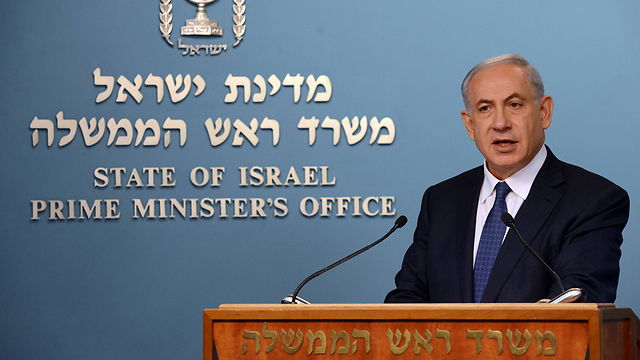Prime Minister Benjamin Netanyahu on Friday said that any final agreement between Iran and world powers must insist that Iran commit to recognising Israel’s right to exist.
The leader spoke after meeting with his security cabinet, which he said was “united in opposition to the proposed deal” between the parties announced on Thursday.
“Israel demands that any final agreement with Iran will include a clear and unambiguous Iranian commitment of Israel’s right to exist,” Netanyahu said in a statement.
Netanyahu, who earlier spoke by phone with US President Barack Obama, voiced Israel’s strong opposition to the framework agreement reached between Iran and world powers, which Netanyahu said poses a grave danger to Israel, the region and the world.
“A deal based on this framework would threaten the survival of Israel,” Netanyahu said, slamming Iran for its regional activities.
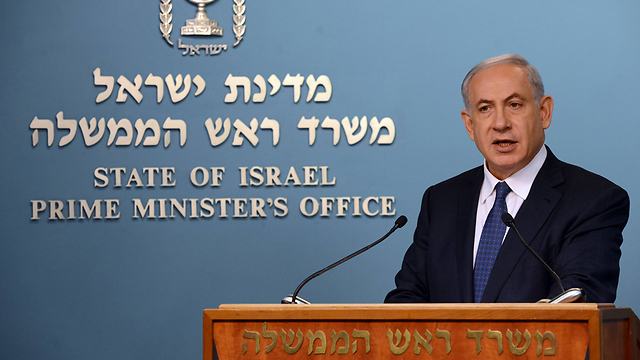
Benjamin Netanyahu (Photo: Haim Zach, GPO)
In response to the deal, Netanyahu will hold talks with the Security Cabinet, which includs ministers, as well as senior officials from Israel’s security services, an aide told AFP Friday morning. “The prime minister will hold security consultations,” the aide said, without providing details.
According to Netanyahu, “This deal would legitimize Iran’s nuclear program, bolsters Iran’s economy, and increase Iran’s aggression. Such a deal would not block Iran’s path to the bomb. It would pave it… (and) increase the risks of nuclear proliferation in the region and the risks of a horrific war,” Netanyahu said in a statement regarding his phone call with Obama.
“The alternative is standing firm and increasing the pressure on Iran until a better deal is achieved,” he said.
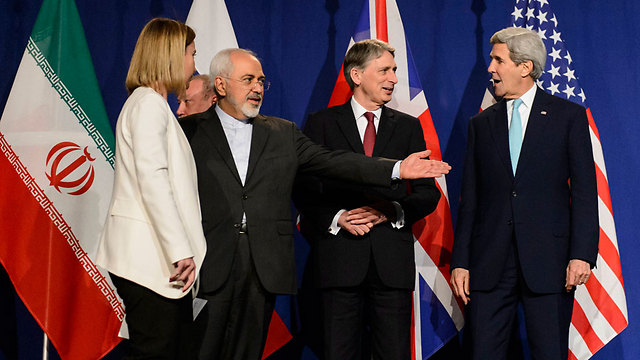
US Secretary of State John Kerry (R) with British Foreign Secretary Philip Hammond, Iran’s Javed Zarif EU foreign policy chief Federica Mogherini (L) (Photo: AP)
Netanyahu believes Iran is trying to develop a nuclear bomb – a concern that has been shared by much of the world. He considers a nuclear-armed Iran a threat to Israel’s very existence, given Iranian leaders’ calls for the destruction of the Jewish state, Iran’s support for hostile militant groups across the region and its development of long-range ballistic missiles.
Speaking at the White House, President Barack Obama called it a “good deal” that would address concerns about Iran’s nuclear ambitions. Iranian Foreign Minister Mohammad Javad Zarif called it a “win-win outcome.”
The framework deal includes a system of limits and inspections on Iranian nuclear facilities, but falls short of Israeli demands to dismantle the program. Netanyahu believes Iran cannot be trusted, and that leaving certain facilities intact would allow the Iranians to reach the capability of building a bomb.
Netanyahu has warned of Iran’s nuclear intentions for years, and has said that preventing Iran from developing a bomb is the mission of his lifetime. As details of the framework were being finalised, Netanyahu demanded in a post on Twitter that any deal achieved with Iran “must significantly roll back Iran’s nuclear capabilities.”

Netanyahu attached a diagram to his tweet showing Tehran’s involvement in Middle East conflicts in Yemen, Iraq, Lebanon and Egypt and reiterated Israel’s demands that Iran “stop its terrorism and aggression.”
In Washington, Obama, who has had a rocky relationship with Netanyahu over Iran and other matters, tried to soothe Israeli concerns. At a news conference, he called the deal “the best option” for preventing Iran from developing a nuclear weapon.
In his phone call with Netanyahu, Obama said the framework would bring a deal “that cuts off all of Iran’s pathways to a bomb,” according to the White House. It said the deal “in no way diminishes” US concerns about “Iran’s sponsorship of terrorism and threats toward Israel” or America’s commitment to Israel’s security.
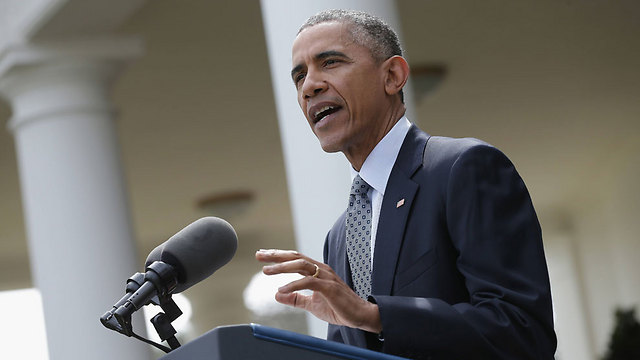
Photo: AFP
Earlier, Obama said had spoken with the Saudi king, and announced that he was inviting the leaders of six Gulf nations, including Saudi Arabia, to Washington this spring. Netanyahu has said moderate Arab states see “eye to eye” with him on Iran.
While Netanyahu has threatened in the past to attack Iranian nuclear facilities, that option seems to be a long shot at this stage.
His best bet for foiling the deal could lie with the Congress, where Israel enjoys bipartisan support. Lawmakers have been threatening to try to delay the agreement or even push for new sanctions against Iran.
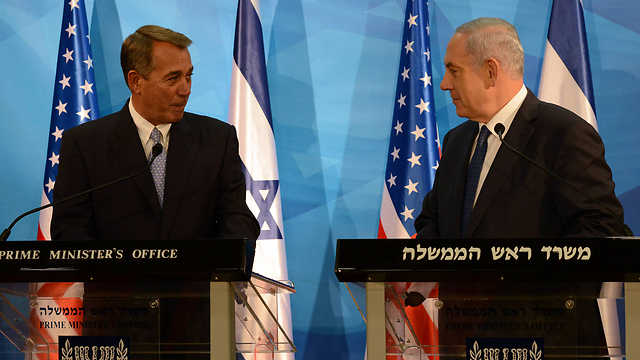
Netanyahu with House Speaker John Boehner, who visited Israel this week (Photo: Haim Zach, GPO)
Yuval Steinitz, an Israeli Cabinet minister who monitors the Iranian nuclear program, said Israel would continue to push to cancel or at least improve the deal as it is finalized ahead of a June 30 deadline.
Capping exhausting and contentious talks, Iran and world powers sealed a breakthrough agreement Thursday outlining limits on Iran’s nuclear program to keep it from being able to produce atomic weapons. The Islamic Republic was promised an end to years of crippling economic sanctions, but only if negotiators transform the plan into a comprehensive pact.
They will try to do that in the next three months.
Yoel Guzansky, a former Iran analyst in the Israeli prime minister’s office and a research fellow at the INSS think tank in Tel Aviv, said Thursday’s announcement was a game changer.
The deal starts a process “where Iran will stop being a pariah state,” he said. “Israel will need to see how to inspect Iran on its own, and not rely on the international community.”
In recent weeks, Netanyahu has stepped up his rhetoric. Last month, Netanyahu harshly criticized the emerging agreement in a speech to the US Congress, enraging the White House because the visit was arranged behind its back with Republican lawmakers.
But the speech, and furious Israeli lobbying to other participants in the Iran talks, appeared to have made little difference.
Britain, Germany, France and Italy – all key European allies and all directly or indirectly involved in the negotiations in Switzerland – welcomed the deal.
“We are closer than ever to an agreement that makes it impossible for Iran to possess nuclear weapons,” German Chancellor Angela Merkel said. “That is a great credit to all negotiating partners.”
French President Francois Hollande saluted the work of the foreign ministers, but cautioned that sanctions remained on the horizon if the final agreement set for June 30 were not respected.
Russia, another participant in the talks, said the deal could have a “positive influence” on the region. UN Secretary-General Ban Ki-moon said the framework “paves the way” for a historic agreement that could “contribute to peace and stability in the region.”
Reuters and the Associated Press contributed to this report.
http://www.ynetnews.com/articles/0,7340,L-4644036,00.html





